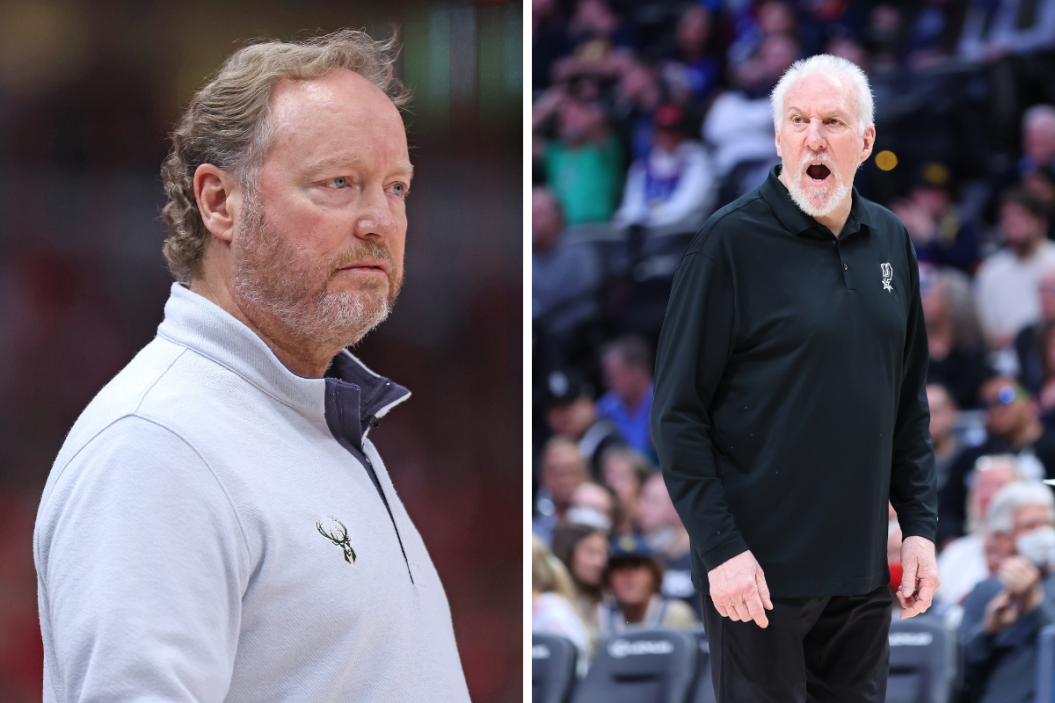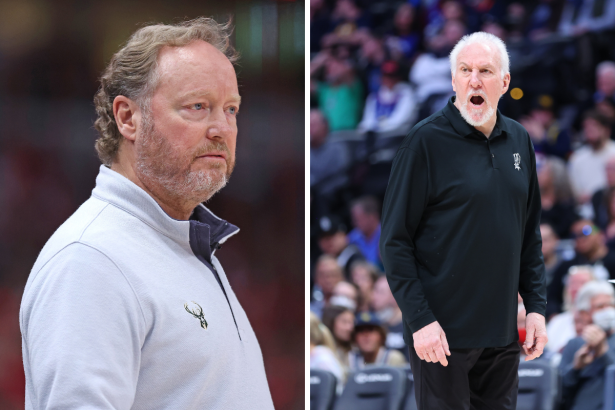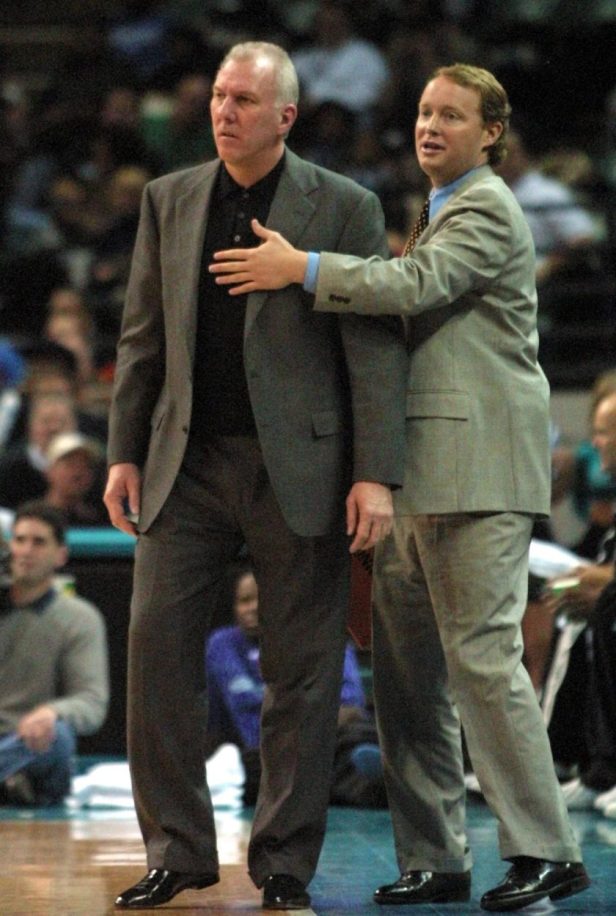As the postseason gets underway, there can only be one defending champion. And for the defending champs — the Giannis Antetokounmpo-led Milwaukee Bucks and coach Mike Budenholzer — there can only be one mission: Do it again.
Videos by FanBuzz
And for Coach Bud, it might be the only basketball topic he can't call his old mentor, the NBA's all-time winningest coach and (still) San Antonio Spurs coach Gregg Popovich, and ask for advice about.
Budenholzer won his first NBA title as a head coach in 2021, leading Milwaukee past the Phoenix Suns in the NBA Finals and bringing the Bucks their first championship since 1971. Budenholzer was an assistant coach under Popovich in San Antonio for 18 seasons, where he was a part of four championships before leaving to be the head coach of the Atlanta Hawks in 2013.
Success as a head coach was immediate. Bud led the Hawks to the postseason in his first season, in 2013-14, and won the NBA Coach of the Year award the following year behind a 60-22 regular season.
After parting with Atlanta following the 2018 season, he immediately signed to become head coach of the Bucks, where he again won 60 games and again was named NBA Coach of the Year in his first season in Wisconsin. After knocking on the door in 2019, and a disappointing exit from the bubble in 2020, Bud and the Bucks got over the hump and beat the Suns in six games to win the title in 2021.
Mike Budenholzer's Back-to-Back Quest: Something Pop Has Never Done
Now is the point when Mike Budenholzer wants to differ from Gregg Popovich. Popovich, despite winning five NBA Finals with the Spurs, never once won two in a row, a feat that, for NBA-Championship-winning coaches has actually become, well, rare.
The NBA's Repeat & 3-Peat Champions
The NBA is a repeat league. It always has been. It started with the Boston Celtics, led by center Bill Russell and coach Red Auerbach, who won eight consecutive championships from 1959-66. And just since my own personal birth in 1984, the following events have occurred in the NBA:
- The Los Angeles Lakers won the NBA FInals in 1987 and '88. Magic Johnson and the Showtime Lakers defeated the Celtics in the '87 NBA Finals, winning in six games. The series is best remembered by Magic's game-winning hook shot over Kevin McHale in Game 4. The Lakers went on to beat the Pistons in seven games, winning the last two games by a total of four points.
- The Detroit Pistons won the NBA Finals in 1989 and 1990. The Pistons represented the last team to ever get the best of Michael Jordan, bullying MJ to death to reach the NBA Finals, where they swept the Lakers in '89 and beat the Portland Trail Blazers in five games in 1990.
- The Chicago Bulls won in 1991, '92 and '93. Jordan and the Bulls finally conquered the Pistons, and the rest is history. They beat the Lakers in five games in '91, the Blazers in six games in '92, and bested MVP Charles Barkley and the Phoenix Suns in six games in '93.
- The Houston Rockets won in 1994 and '95. MJ took two years off from the NBA to play baseball, and the Rockets assumed the throne...for a minute. Hakeem Olajuwon got the better of first Patrick Ewing and the Knicks in 1994 and then of Shaq and Penny Hardaway and the Orlando Magic in 1995.
- The Bulls won again in 1996, '97 and '98. Jordan and Co. picked up where they left off with three more championships. The 1996 team finished the regular season 72-10, a record exceeded only by the 73-9 Golden State Warriors in 2016, and beat the Seattle Supersonics (a real team, I swear) in six games. They then beat the Jazz in six games in '97 and again in '98, and Jordan's game-winning jumper over Bryon Russell is an all-time enduring NBA image.
- Then, the San Antonio Spurs won in 1999. In Tim Duncan's second year and a strike-shortened NBA season, the Spurs knocked off the 8-seed (Cinderella) New York Knicks in five games. This was Gregg Popovich's first championship as Spurs coach.
- The Lakers won in 2000, '01 and '02. Two guys, known worldwide on a first-name basis, sum it up: Kobe and Shaq. Oh, and this was also Phil Jackson's third three-peat coaching.
- The Spurs won in 2003. They beat the New Jersey Nets in six games, holding the Nets, led by Jason Kidd, to 82 points per game.
- The Spurs won in 2005. In a Finals for the ages (not), San Antonio beat the defending champion Detroit Pistons in seven games. The losing team was held below 80 points in five games, with the Pistons 102-71 win in Game 4 being the only time in the series one of the teams broke the century mark. To put this in perspective, in this year's NBA playoffs, in Game 2 of their first round series versus the Nuggets, the Golden State Warriors had 101 points at the end of the third quarter.
- The Spurs won in 2007. It's hard to say that 2007 was the year a young LeBron James officially arrived, given what he'd done in the years prior, but Game 5 of the Eastern Conference Finals against the Pistons was the King's first signature playoff moment. He scored his team's last 25 points in the fourth quarter and overtime to give Cleveland a surprising road victory, eventually winning the series in six games and leading the Cavaliers to the Finals — his first — where they were promptly swept by Pop and The Fundamentals.
- The Lakers won in 2009 and '10. It only took one first name this time, as Kobe added two more championships to his resume with victories over the Orlando Magic in five games in '09 and over the rival Boston Celtics — with their Big 3 of Kevin Garnett, Paul Pierce and Ray Allen — in a thrilling seven game series. This would avenge the Lakers' defeat at the hands of the Celtics two years prior, in the 2008 Finals.
- The Miami Heat won in 2012 and '13. LeBron took his talents to South Beach and, after a disappointing Finals loss to Dallas in 2011, won his first two NBA Championships in back-to-back fashion — beating the Young Gun Oklahoma City Thunder in five games in 2012 and defeating the Spurs in 2013 in seven after they stole Game 6 in OT behind a game-saving offensive rebound and game-tying three-pointer in the waning seconds of regulation by Chris Bosh and Ray Allen, respectively.
- The Spurs won in 2014. The Heat's quest for a three-peat was also a Spurs' quest for vengeance. Having had Miami snatch victory from the arms of defeat the year before, San Antonio was ready to exact revenge when the two met again in the Finals in 2014. The result was a lopsided series. The Spurs won in five games, with their four victories coming by an average of 18 points per.
- The Golden State Warriors won in 2017 and '18. These Warriors, with their core of Steph, Klay, Kevin Durant and Draymond Green, are among the great squads ever in the NBA. Together they reached five consecutive NBA Finals, winning in 2015, '17 and '18. They faced LeBron and the Cleveland Cavaliers in the first four, losing to the Cavs in 2016 after posting the best regular season in NBA history, and then, with Kevin Durant and Klay Thompson suffering serious leg injuries, were defeated in six games by Kawhi Leonard and the Toronto Raptors in 2019.
That's six back-to-backs and three back-to-back-to-backs, with five San Antonio Spurs titles, all coached by Gregg Popovich, sprinkled in between. In a league where teams so often follow up championships with more championships, the Spurs are an outlier, winning five times without ever repeating as champion.
And last season, in 2021, the NBA Finals was won by the Milwaukee Bucks, coached by former Pop-protégé Mike Budenholzer. With a title now under their belt and a stacked roster complete with the best player in the league, the Bucks seem poised to make another run, and are favored by many to at least make a return trip to the Finals.
In a world where any NBA coach would be happy to say they did what Pop did, the question is whether Bud can do what Pop never did, and run one back.


